

Are you dreaming of a stylish and efficient modular kitchen but concerned about the budget? You’re not alone. The modular kitchen cost can vary significantly based on various factors. In this comprehensive guide, we will take you through all the aspects of budgeting for a modular kitchen. By the end of this article, you’ll have a clear understanding of what to expect and how to plan for the kitchen of your dreams by Mettas Lifestyle.
Table of Contents
ToggleIntroduction-Modular Kitchen Cost
The kitchen is the heart of any home, and a modular kitchen combines functionality and aesthetics to create a space that’s both beautiful and efficient. Whether you’re building a new home or renovating your existing kitchen, budgeting is a crucial step in the process. In this guide, we will delve deep into the factors that influence the cost of a modular kitchen and provide you with practical tips to help you make informed decisions.
1. What is a Modular Kitchen?
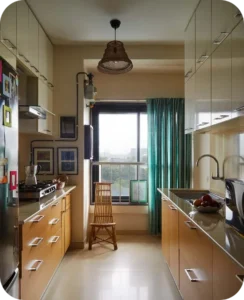
Before we dive into budgeting, let’s understand what a modular kitchen is. A modular kitchen is a modern kitchen design concept that utilizes pre-fabricated modules or units. These modules, including cabinets, countertops, and appliances, are manufactured in a controlled environment and then assembled on-site. The modular approach allows for customization, efficient space utilization, and a sleek, contemporary look.
Now that we have a basic understanding of modular kitchens, let’s explore the key factors that determine their cost.
2. Factors Affecting the Cost
Kitchen Size
The size of your kitchen is a significant factor in determining the cost. Larger kitchens require more materials, cabinets, and countertops, which naturally increases the overall cost. Smaller kitchens, on the other hand, may have a lower budget but can still be highly functional and aesthetically pleasing.
Layout and Design
The complexity of your kitchen’s layout and design can impact the cost. Intricate designs with multiple corners, islands, and unique storage solutions may require more customization, which can add to the expenses.
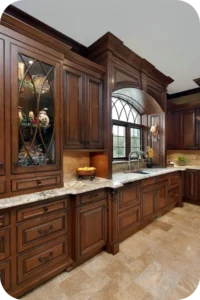
Material Selection
The choice of materials plays a crucial role in cost determination. High-end materials like solid wood, granite, or quartz countertops, and premium finishes will naturally increase the budget. Conversely, opting for cost-effective materials can help you stay within a tighter budget.
Appliances and Accessories
The selection of kitchen appliances and accessories also contributes to the overall cost. High-end, branded appliances will be more expensive than standard ones. Similarly, accessories like pull-out pantry units, soft-closing drawers, and designer handles can add to the budget.
Now that we understand the factors affecting the cost, let’s break down the components of a modular kitchen and their cost implications.
3. Understanding the Components
A modular kitchen comprises several components, each with its cost considerations. Here’s an overview:
Cabinets and Shelves
Cabinets are a fundamental part of any kitchen. They provide storage and contribute significantly to the kitchen’s aesthetics. Cabinet costs can vary based on the material used, the number of cabinets, and any additional features like pull-out shelves or built-in organizers.
Countertops
Countertops are another key element in your kitchen’s design. The cost of countertops depends on the material chosen. Granite, quartz, and marble are more expensive options, while laminates are more budget-friendly.

Appliances
The cost of kitchen appliances can vary widely. High-end brands and models with advanced features come at a premium, while basic appliances are more budget-friendly. Consider your cooking habits and needs when selecting appliances.
Sink and Faucet
The sink and faucet are essential fixtures in the kitchen. Stainless steel sinks and standard faucets are economical choices, but you can also opt for more stylish and premium options.
Lighting
Proper lighting is crucial in a kitchen. While basic lighting fixtures are affordable, designer lighting can add to the cost. LED lighting, under-cabinet lights, and pendant lights are popular choices for modern kitchens.
Now that we’ve covered the components, let’s move on to budget planning.
4. Setting Your Budget
Setting a realistic budget for your modular kitchen is essential to avoid overspending. Here are some steps to help you establish a budget:
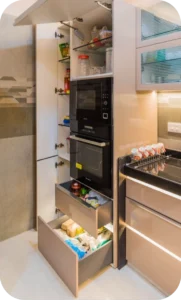
Research and Quotes
Begin by researching modular kitchen prices in your area. Contact multiple kitchen vendors and ask for detailed quotes based on your kitchen’s size and design. This will give you a clear idea of the average cost.
Contingency Fund
It’s wise to set aside a contingency fund of around 10-20% of your budget for unforeseen expenses or design changes. This will help you avoid financial stress during the project.
5. Tips for Cost-Effective Modular Kitchens
While modular kitchens offer flexibility in design, there are ways to make them more budget-friendly without compromising on quality. Here are some tips:
Prioritize Your Needs
Identify your must-have features and prioritize them in your design. Focus on what you need rather than what you want to keep the budget in check.
DIY vs. Professional Installation
If you’re handy with tools, you might consider a DIY approach for aspects like painting or minor installations. However, for complex tasks like cabinet assembly and countertop installation, it’s best to hire professionals to ensure a flawless finish.
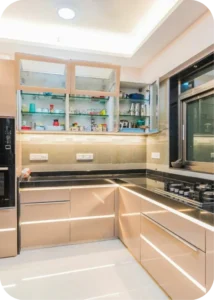
Material Choices
Choose materials wisely. Opt for cost-effective yet durable materials for components like cabinets and countertops. You can allocate more budget to high-visibility areas like cabinet fronts and countertops and choose more economical options for less visible areas.
Bargain Shopping
Look for discounts, promotions, and clearance sales when purchasing materials and appliances. Shopping during festive seasons or clearance events can save you a substantial amount.
6. Case Study: Real-Life Modular Kitchen Budgets
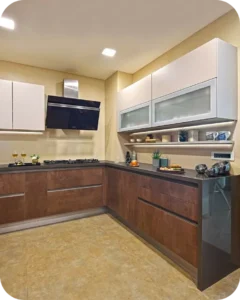
To provide you with a better understanding, let’s look at a few real-life examples of modular kitchen budgets:
Basic Budget Kitchen: A small modular kitchen with standard laminated cabinets, basic appliances, and a laminate countertop can cost anywhere from $3,000 to $6,000.
Mid-Range Kitchen: A medium-sized kitchen with mid-range materials like plywood cabinets, granite countertops, and branded appliances can have a budget ranging from $6,000 to $15,000.
High-End Luxury Kitchen: A large kitchen with premium materials like solid wood cabinets, quartz countertops, designer appliances, and customized features can go beyond $20,000, reaching $50,000 or more.
7. Flooring
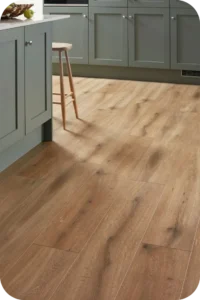
While often overlooked, the choice of flooring can impact your kitchen’s overall look and feel. Flooring options such as tiles, hardwood, or laminate can vary in cost. Consider durability, maintenance, and your budget when selecting the right flooring material for your kitchen.
8. Backsplash
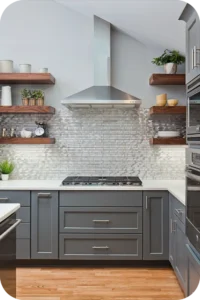
A stylish backsplash not only protects your kitchen walls but also adds a decorative element. The cost of backsplash materials, such as ceramic tiles, glass, or stainless steel, can vary. Opting for a budget-friendly backsplash material can help balance your overall expenses while enhancing your kitchen’s visual appeal.
9. Installation and Labor Costs

Don’t forget to include installation and labor costs in your budget. Professional installation ensures that your modular kitchen is assembled and installed correctly. Labor costs can vary based on the complexity of your kitchen design, so be sure to obtain quotes from reputable installers.
With these additional considerations, you’ll have a more comprehensive budget for your modular kitchen project, ensuring that you can create a functional and beautiful space that fits your financial plan.
10. Maintenance and Long-Term Costs

It’s essential to factor in the long-term costs associated with maintaining your modular kitchen. Some materials and finishes may require more upkeep than others. Consider the cost of cleaning supplies, repairs, and any potential replacements over the years. Choosing durable and low-maintenance materials can help reduce long-term costs and ensure your kitchen remains in excellent condition for years to come.
Conclusion
In conclusion, budgeting for a modular kitchen is a critical step in achieving your dream kitchen while maintaining financial prudence. By considering factors such as kitchen size, layout, material choices, and components, you can create a budget that aligns with your needs and preferences.
Remember that a modular kitchen is an investment in both the functionality and aesthetics of your home. With careful planning, research, and cost-effective choices, you can have a kitchen that not only suits your budget but also enhances your daily life.
Related topic you must read: Best Kitchen Gadgets
FAQs:
The installation time for a modular kitchen can vary based on the kitchen’s size and complexity. On average, it may take anywhere from 1 to 3 weeks for installation, including assembling cabinets, countertops, and appliances.
Yes, modular kitchens offer customization options to fit various budgets. You can prioritize cost-effective materials, choose standard-sized cabinets, and select fewer premium features to stay within your budget.
Modular kitchens typically require minimal maintenance. Regular cleaning and occasional checks for wear and tear are usually sufficient. However, consider budgeting for any unexpected repairs or replacements in the long term.
When selecting a kitchen installer, ensure they have experience in modular kitchen installations. Check for references, read reviews, and request a detailed quote that includes labor costs. Choose a professional with a good reputation to ensure a hassle-free installation.
Modular kitchens are designed for flexibility, but major design or component changes after installation can be challenging and costly. It’s best to finalize your design and components during the planning phase to avoid significant alterations later on.
Some kitchen vendors offer financing or installment payment options to help spread the cost over time. Check with your chosen vendor for any available financing plans and their terms.
Budgeting for a modular kitchen involves careful consideration of various factors, but with the right planning and information, you can create a kitchen that suits your style and budget, adding value to your home and enhancing your culinary experience.




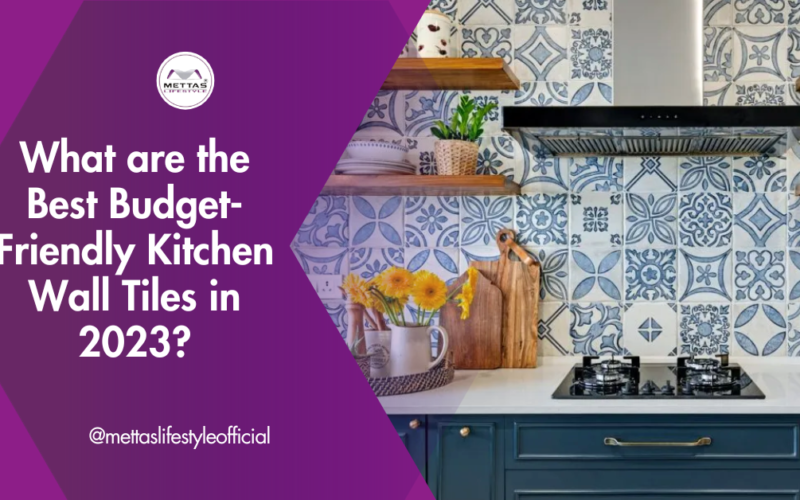
2 comments. Leave new
[…] Related topics you must read: How Much Does Modular Kitchen Cost? […]
[…] Related topics you must read: The Ultimate Guide to Budgeting: How Much Does Modular Kitchen Cost? […]